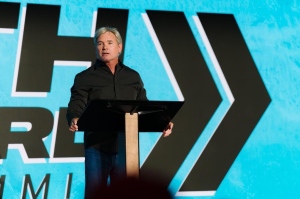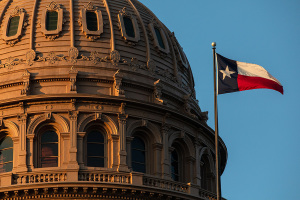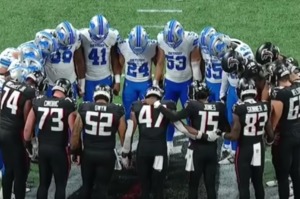Churches urged to assist ballot collection efforts, voter education ahead of 2024 election
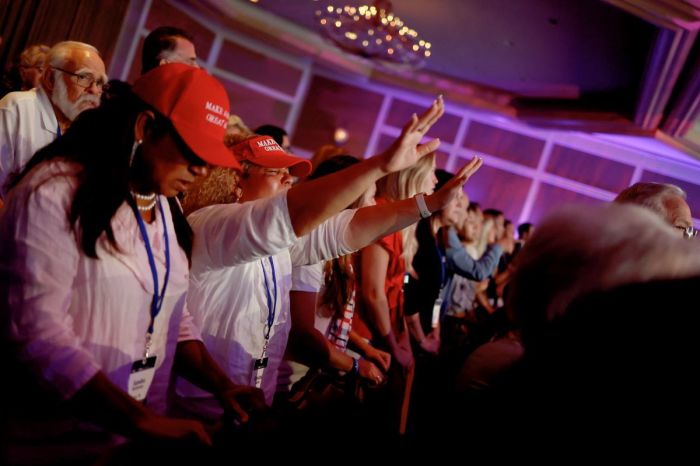
Editors' note: This is part 1 of The Christian Post's year-long articles series "Politics in the Pews: Evangelical Christian engagement in elections from the Moral Majority to today." In this series, we will look at issues pertaining to election integrity and new ways of getting out the vote, including churches participating in ballot collection. We'll also look at issues Evangelicals say matter most to them ahead of the presidential election and the political engagement of diverse groups, politically and ethnically. Read other articles in the series by clicking here.
Christian and conservative advocacy organizations are urging churches to take an active role in voter outreach and ballot-collection efforts with the 2024 presidential election just over a year away, saying they must take advantage of mail-in ballot laws even if the majority of them prefer to vote in person.
The term "ballot harvesting" has become a buzzphrase in recent years with the expansion of mail-in and absentee ballot voting, which became a more mainstream way to vote during the 2020 COVID-19 pandemic and subsequent lockdowns.
"Ballot harvesting" describes the process in which a person, sometimes a paid political operative, collects absentee ballots en masse from voters and turns them in on their behalf.
Although many conservatives were urged to vote in person during the 2020 presidential election in which Democrat President Joe Biden won, leading Christian and conservative activist organizations have given space at their annual conferences this year to stress the importance of evening the playing field by mobilizing churches and the faithful to "bank" votes before Election Day.
Rejecting the 'negative connotation' of 'ballot harvesting'
The term "ballot harvesting" carries a negative connotation for many conservatives as it is often used to make the practice appear nefarious or outside the bounds of the rules. But since several state election laws allow for such efforts, other terms like "ballot gathering" or "ballot collecting" are becoming popular alternatives amid attempts to get Christian conservatives more engaged in the effort.
Gina Gleason, who leads the Real Impact ministry focusing on ballot-gathering efforts at the California-based megachurch Calvary Chapel Chino Hills, identified 17 states where churches can feasibly take an active role in ballot collecting during a panel discussion at the Family Research Council's Pray, Vote, Stand Summit in Washington, D.C., last month.
Those states include: California, Delaware, Hawaii, Idaho, Illinois, Maryland, Nevada, New York, Oregon, Rhode Island, South Dakota, Tennessee, Utah, Vermont, Virginia, Washington and Wyoming.
In an interview with The Christian Post, Gleason said that while she believes "the best way to vote would be to walk into a polling location and vote in person," "California law says that a person can turn in a ballot for any person."
She recalled, "Prior law said that you had to be a family member or reside in the same household."
"Well, that was abolished, and it just opened it up to anyone … whether it's a neighbor or whether it's a stranger knocking at your door. So, anyone can turn a ballot in for a voter. And there is no limitation on the number of ballots that you can turn in," Gleason said.
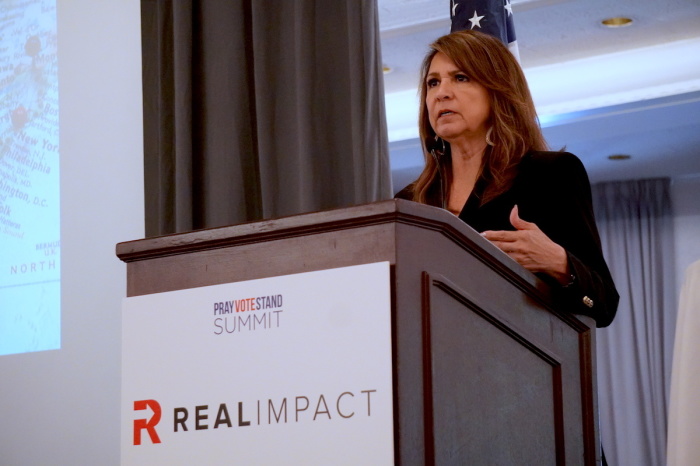
Jason Yates is the CEO of the advocacy group My Faith Votes, which describes itself as a "non-partisan movement that motivates, equips and activates Christians in America to vote in every election, transforming our communities and influencing our nation with biblical truth." His organization is also encouraging churches to get involved in ballot-collection efforts.
"I agree that we all should be looking at ways that we can leverage what's available to get more people voting," Yates told CP.
He believes that encouraging people to "only vote on polling day at a polling place" ends up "suppressing some of the potential votes that could be brought in."
"Everyone should be taking full advantage of the opportunities that are given to vote, and I think … churches being involved in that process is really important," he added.
Yates cited survey data finding that most born-again Evangelical Christians reported that their churches did nothing to "help or encourage" them to vote as a reason why churches should take a more active role in promoting civic participation.
Gleason told CP that in light of the "negative connotation" of the term "ballot harvesting," she prefers to use the phrase "ballot collecting."
Yates prefers the term "ballot gathering" to describe what his organization is "encouraging churches to do." He wants to portray activities undertaken by churches as different from "ballot harvesting," which he described as a system where "political operatives are paid to collect [a] large number of ballots."
"My Faith Votes is creating some guides and toolkits for churches" to legally engage in such efforts, he explained. Yates predicted that such material will include "some legal guidance around what they can and can't do" in their particular state and "lay out specific processes that they can follow to make sure that they're abiding by the laws of their particular state." The materials will also include other information "that will help them just encourage people to vote."
Yates anticipates the guides and toolkits will be ready in late 2023 or early 2024. My Faith Votes will also share materials to help people register to vote and promotional videos that churches can play during services talking about the importance of voting."
"[Then we'll lay] out a process that the church can follow to encourage people to bring their ballots … to the church and drop them off there," Yates detailed.
The My Faith Votes head pushed back on the idea that efforts to encourage churchgoers to vote in elections constitute a "political" activity by churches.
"While it is, I would say, a civic activity, I don't see it as a political activity. … Ballot gathering is not … an attempt to be partisan or to tell people how to vote," he contends. "It's encouraging them to vote and be involved in the process and having the church play an active role."
Steps churches can take
Gleason elaborated on the steps a church seeking to engage in ballot collecting should take, beginning with obtaining permission from church leadership.
"Pray about it, educate yourself about the laws of your state, what you can and cannot do, and how it would benefit your church and your local community," she added. Real Impact Ministries has also compiled a sample letter those wishing to engage in ballot collecting can send to their pastor.
Gleason urged those wanting their churches to collect ballots to "prepare early," maintaining that "right now is the time to prepare" with primary elections early next year.
"Build a team, train the team, make sure the team knows all the laws that you know, and that way, when they are standing at the table, they have answers for the people turning their ballots in," she said.
Gleason listed tables, signs, pens, lockboxes and glue sticks as necessary supplies for churches hoping to orchestrate a ballot collection effort.
Once a church obtains ballots from voters and places them in lockboxes for security, Gleason said they must be turned in to the proper election officials. She clarified that churches are not official dropbox locations and warned places of worship not to identify themselves as such.
Voter education tools
Faith-based organizations' efforts before the 2024 election also extend to voter education. My Faith Votes has a tool called My Voter Hub, where "people can sign up for election reminders, things that give them information about everything they need to know for Election Day and/or … the election as a whole."
At the Family Research Council's Pray, Vote, Stand Summit in September, one panel discussion promoted iVoterGuide, a project of the American Family Association that has evaluated the policy positions of more than 13,000 candidates and educated 6.8 million voters in 2022, as a resource for faith-based voters.
Debbie Wuthnow, the president of iVoterGuide and vice president of AFA Action, described the resource as a "one-stop shop for information regarding the election."
By typing in their address, voters will gain access to a "personalized ballot" that will include all federal candidates running for elected office, statewide candidates in 40 states and state legislative candidates in 35 states. The website examines the candidates' ideology and features scorecards detailing how legislators vote on legislation and spotlighting endorsements candidates have received and contributions they have given to other candidates or causes.
iVoterGuide also sends candidates a questionnaire featuring 30 to 35 questions probing their opinions on matters related to the "right to life, the economy, healthcare, energy [and the] Second Amendment." The site contains information about ballot measures related to election integrity and the abortion issue.
Community Impact Teams
The Family Research Council's National Director for Community Impact Tim Throckmorton stressed the importance of churches creating "Community Impact Teams" at the panel discussion.
He identified the primary benefits of a Community Impact Team as "information," "equipping," "alerts" and "mobilization," praising the "boots on the ground influence" of such an organization for creating a heightened "level of awareness" about important political issues among churchgoers.
"The churches that do this have found that volunteerism ticks up, more people are being made aware and their communities are blessed because they are encouraging people to run for office, they are training people to run for office, they're researching and vetting candidates that are running for office at a local level."
During a "Community Impact Training" event hosted by the Family Research Council earlier this month, Throckmorton insisted that every Community Impact Team needs to have a leader, preferably "someone with character" and "someone that you can count on."
Recommended additional members of a Community Impact Team include a researcher and writer, someone who deals with communications, data and social media, a person dedicated to prayer and another individual focused on mobilization that "plans events."
Throckmorton cited voter registration drives, voter education in the form of "non-partisan voter guides" and candidate forums as examples of activities Community Impact Teams could engage in or lead. He also suggested that members of Community Impact Teams should attend local government meetings such as school board meetings and town council meetings.
Throckmorton, who has personal experience serving on a Community Impact Team, discussed how, as a result of team members attending such events, "relationships were built between the church and those leaders in the community."
"Often, when something is going on at a local level, and you're made aware of it, just showing up makes a great difference," he added. "And so this is where attending the meetings helps you see what the need is and assess what the need is, and in some cases, that's where the CIT begin to see how they could get plugged into a local setting."
Throckmorton highlighted a resource dedicated to Community Impact on the Family Research Council website. He also plugged iVoterGuide as a resource for Community Impact Teams.
Additional resources are available in a booklet compiled by the Family Research Council, titled Community Impact Resource Manual: How to Establish a Ministry at Your Church. At the end of the training session, FRC President Tony Perkins recalled creating a course called "God and Government" when he led a Community Impact Team 20 years ago and announced that he was putting together a "rework of this course" that will be transformed into an "online video series for our Community Impact Teams."
"When you pull your team together, you'll be able to, each week, you can have a one-hour course" focusing on a particular subject within the course, Perkins said.
Christians must 'vote in every race and every election'
At the Pray, Vote, Stand Summit, Wuthnow shared voter registration statistics as she attempted to make the case that Christians have an obligation to vote in all elections, not just high-profile presidential contests. She informed the crowd that 65% of eligible voters are registered to vote.
Wuthnow did not touch on voter turnout in presidential elections but stated that 38% of registered voters participate in off-year elections in which there is no presidential election.
Wuthnow clarified that the 38% of registered voters who vote constitute 26% of eligible voters. She also brought up statistics for primary elections, which she characterized as the most critical races in some parts of the country since many electoral districts are drawn to favor one party or the other in the general election. In primary elections, 20% of registered voters and 14% of eligible voters vote.
As school board elections have become increasingly important in American politics, Wuthnow lamented that just 6% of registered voters and 4% of eligible voters cast ballots in such contests. She warned that the low level of participation in school board elections means that small but influential interest groups such as "educational activists" and "trans activists" play an outsized role in determining the outcome.
Wuthnow also addressed the phenomenon of "under voting," where voters select candidates in high-profile races such as the presidential contest and gubernatorial election while not voting for candidates further down the ballot, such as a state representative or an auditor, a factor she attributed to "a lack of information" about the lesser-known candidates.
Wuthnow added that, on average, "35% to 45% of ballots have at least one race that is left blank." She concluded her presentation by urging Christians to "vote in every race and every election."
On Saturday, Gleason is hosting an all-day workshop at Calvary Chapel Chino Hills that will discuss various topics, including ballot collecting for churches, voter registration laws and "legal do's and don'ts for churches." The workshop is designed for pastors, church representatives, members of Community Impact Teams, as well as organization leaders and teammates. The conference will not be livestreamed, but it will be posted online at a later date.
Ryan Foley is a reporter for The Christian Post. He can be reached at: ryan.foley@christianpost.com















